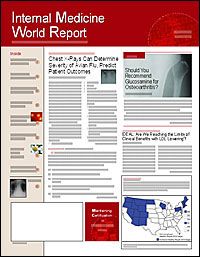Publication
Article
Internal Medicine World Report
Bisphosphonates Plus NSAIDs a Safe Combination
Author(s):
Questions have arisen about the safety of taking both a bisphosphonate and a nonsteroidal antiinflammatory drug (NSAID), particularly in patients at high risk of gastrointestinal (GI) side effects. A large, well-designed study (Mayo Clin Proc. 2005;80:1278-1285) has now demo?nstrated that such a combination does not increase susceptibility to GI adverse events.
Investigators pooled data from 2 ?randomized, double-blind, placebo-controlled studies involving almost 2500 patients. They were randomly assigned to 1 of 4 treatment groups: once-daily ?risedronate (Actonel) 5 mg; once-daily risedronate 15 mg; once-weekly risedronate, 35 or 50 mg; or placebo.
Mean age of patients in the once-daily risedronate groups was 62 years (60% were postmenopausal women). When the study began, 63% of these patients were regular users of aspirin and/or other NSAIDs. And 41% had a history of upper GI tract disease. After 2 years of treatment, both daily dosages appeared to be safe and well tolerated compared with placebo (Table).
The total number of upper GI side effects was similar in all 3 daily treatment groups: 176 for risedronate 5 mg, 150 for risedronate 15 mg, and 161 for placebo. The frequency of each type of adverse event was low and was not influenced by dosage. In addition, most of the events were mild and did not result in withdrawal from the study.
Of note, compliance was excellent, with 93% in the risedronate 5-mg group, 92% in the risedronate 15-mg group, and 91% in the placebo group taking at least 75% of their medications.
The once-weekly risedronate dosages also compared favorably with placebo. In one study, 25% of those taking 50 mg weekly risedronate had an upper GI tract adverse event compared with 22% of those taking placebo. In the other study, the respective incidences for the 35-mg weekly active dose versus placebo were 17% and 15%. The ?incidence of moderate-to-severe upper GI tract side effects was also comparable: 12% with the 50-mg active dose versus 11% with placebo; and 5% with both the 35-mg risedronate and placebo.
?Because bisphosphonates are taken long-term, therapies must be safe and well tolerated for all patients who may present in a clinical setting," wrote Silvano Adami, MD, of the Rheumatologic Rehabilitation Unit, University of Verona, Italy, and colleagues.
They noted that the participants represented a population at high risk for GI side effects. And while those with a history of GI disease did report more upper GI side effects, whether they were taking placebo or active treatment, ?the effect of these risk factors was similar across treatment groups, and daily risedronate did not exacerbate the disease," they wrote.






